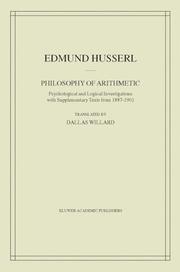| Listing 1 - 5 of 5 |
Sort by
|
Book
Year: 2003 Publisher: Liège : Université de Liège, Institut de mathématique (ULg),
Abstract | Keywords | Export | Availability | Bookmark
 Loading...
Loading...Choose an application
- Reference Manager
- EndNote
- RefWorks (Direct export to RefWorks)
Langages formels --- Formal languages. --- Nombres, Théorie des --- Arithmetique --- Numeration --- Arithmetique --- Numeration
Book
ISBN: 288074542X 9782880745424 Year: 2003 Publisher: Lausanne : Presses Polytechniques et Universitaires Romandes,
Abstract | Keywords | Export | Availability | Bookmark
 Loading...
Loading...Choose an application
- Reference Manager
- EndNote
- RefWorks (Direct export to RefWorks)
Jettons --- Arithmetic --- Abacus --- Jetons --- Arithmétique --- Abaques (Mathématiques) --- History --- Histoire --- Mathematics --- Number theory --- Arithmétique --- Abaques (Mathématiques)
Book
ISBN: 2503511961 Year: 2003 Volume: 70 (n.s. 33) Publisher: Turnhout : Brepols,
Abstract | Keywords | Export | Availability | Bookmark
 Loading...
Loading...Choose an application
- Reference Manager
- EndNote
- RefWorks (Direct export to RefWorks)
Mathematics --- Mathématiques --- Early works to 1800 --- Ouvrages avant 1800 --- Mathématiques --- Mathématiques financières. --- Arithmétique --- Histoire --- Histoire. --- Mathématiques financières. --- Arithmétique
Book
ISSN: 16226267 ISBN: 2733210262 9782733210260 273329007X 9782733290071 Year: 2003 Publisher: Paris : L'institut National D'études Démographiques
Abstract | Keywords | Export | Availability | Bookmark
 Loading...
Loading...Choose an application
- Reference Manager
- EndNote
- RefWorks (Direct export to RefWorks)
Mortality --- Probabilities --- Deparcieux, Antoine, --- Life insurance --- Mortality - Early works to 1800 --- Probabilities - Early works to 1800 --- Life insurance - Early works to 1800 --- Deparcieux, Antoine, - 1703-1768 --- Social Sciences --- France --- histoire des sciences --- mortalité --- dépopulation --- arithmétique politique --- table de mortalité

ISBN: 1402015461 1402016034 9401000603 9781402015465 9781402016035 Year: 2003 Volume: 10 Publisher: Dordrecht Kluwer
Abstract | Keywords | Export | Availability | Bookmark
 Loading...
Loading...Choose an application
- Reference Manager
- EndNote
- RefWorks (Direct export to RefWorks)
In his first book, Philosophy of Arithmetic, Edmund Husserl provides a carefully worked out account of number as a categorial or formal feature of the objective world, and of arithmetic as a symbolic technique for mastering the infinite field of numbers for knowledge. It is a realist account of numbers and number relations that interweaves them into the basic structure of the universe and into our knowledge of reality. It provides an answer to the question of how arithmetic applies to reality, and gives an account of how, in general, formalized systems of symbols work in providing access to the world. The "appendices" to this book provide some of Husserl's subsequent discussions of how formalisms work, involving David Hilbert's program of completeness for arithmetic. "Completeness" is integrated into Husserl's own problematic of the "imaginary", and allows him to move beyond the analysis of "representations" in his understanding of the logic of mathematics.Husserl's work here provides an alternative model of what "conceptual analysis" should be - minus the "linguistic turn", but inclusive of language and linguistic meaning. In the process, he provides case after case of "Phenomenological Analysis" - fortunately unencumbered by that title - of the convincing type that made Husserl's life and thought a fountainhead of much of the most important philosophical work of the twentieth Century in Europe. Many Husserlian themes to be developed at length in later writings first emerge here: Abstraction, internal time consciousness, polythetic acts, acts of higher order ('founded' acts), Gestalt qualities and their role in knowledge, formalization (as opposed to generalization), essence analysis, and so forth.This volume is a window on a period of rich and illuminating philosophical activity that has been rendered generally inaccessible by the supposed "revolution" attributed to "Analytic Philosophy" so-called. Careful exposition and critique is given to every serious alternative account of number and number relations available at the time. Husserl's extensive and trenchant criticisms of Gottlob Frege's theory of number and arithmetic reach far beyond those most commonly referred to in the literature on their views.
Mathematical logic --- Arithmetic. --- Mathematics --- Number concept. --- Philosophy. --- Mathematics. --- Modern philosophy. --- Phenomenology. --- History. --- Number theory. --- Number Theory. --- History of Mathematical Sciences. --- Modern Philosophy. --- Arithmetic --- Arithmétique --- Concept du nombre --- Getal (Begrip) --- Getal (Concept) --- Getalbegrip --- Getalconcept --- Nombre (Concept) --- Number concept --- Rekenkunde --- Apperception --- Psychology --- Logic of mathematics --- Mathematics, Logic of --- Set theory --- Calculators --- Numbers, Real --- Philosophy --- Phenomenology . --- Modern philosophy --- Annals --- Auxiliary sciences of history --- Math --- Science --- Philosophy, Modern --- Number study --- Numbers, Theory of --- Algebra --- Mathematics - Philosophy.
| Listing 1 - 5 of 5 |
Sort by
|

 Search
Search Feedback
Feedback About UniCat
About UniCat  Help
Help News
News